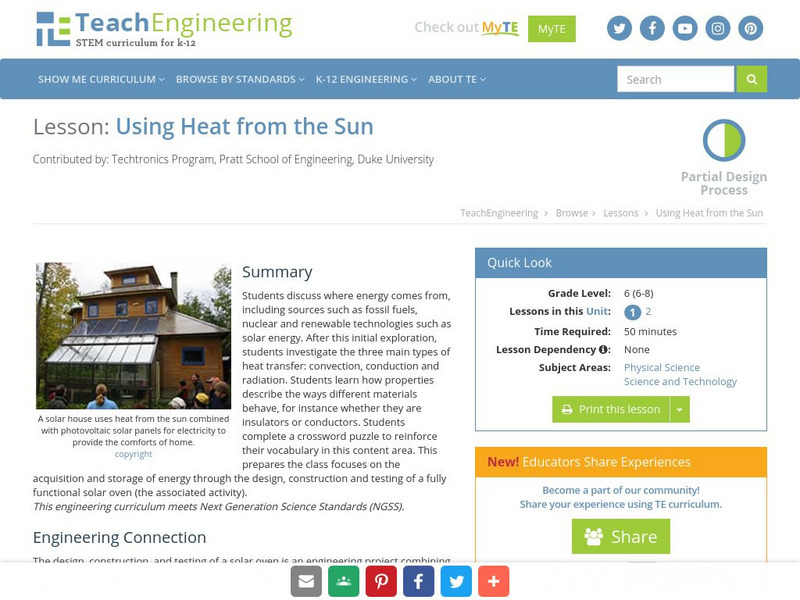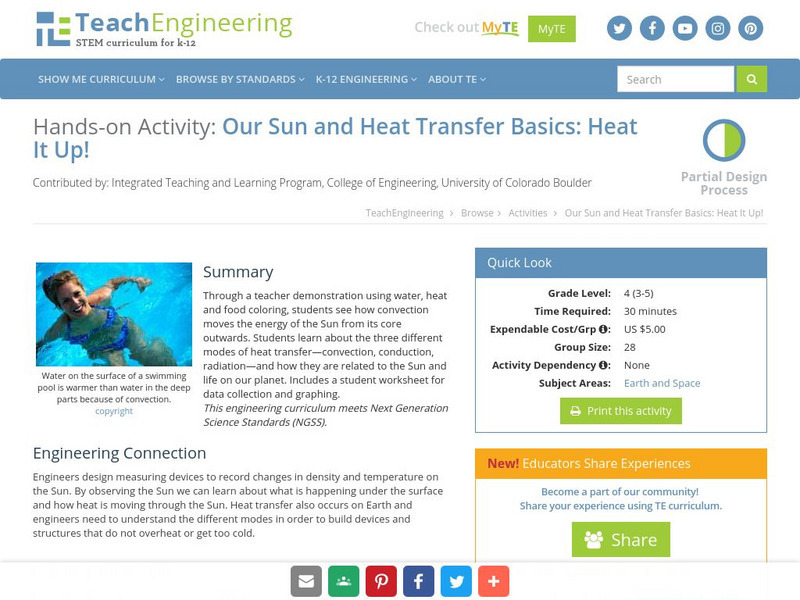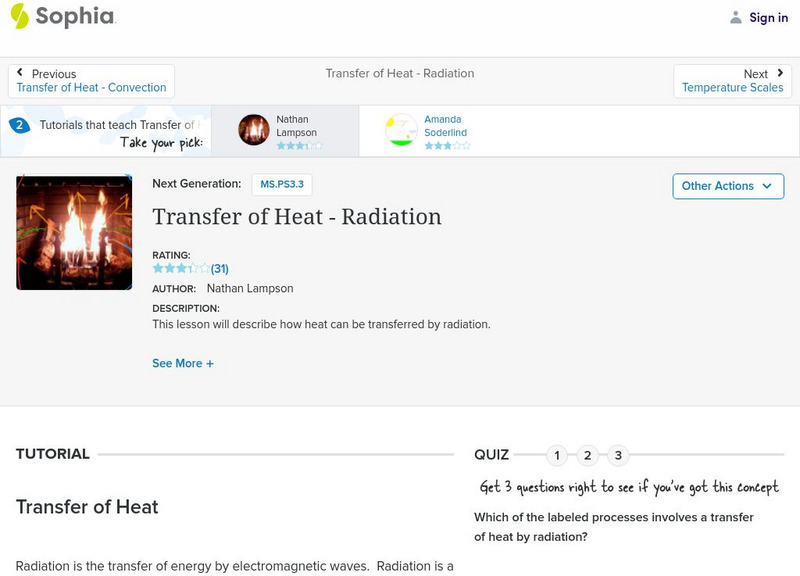University of Calgary
University of Calgary: Energy Education: Geothermal Gradient
A good, concise explanation of the geothermal gradient and how and why the Earth's temperature gets hotter and hotter with increasing depth. Includes two diagrams showing this and the heat transfer mechanisms that are taking place.
ClassFlow
Class Flow: Heat
[Free Registration/Login Required] This flipchart investigates how heat is produced and the effects of heating and cooling and demonstrates how a change in temperature indicates a change in heat. Students will sequence objects according...
Other
Mister teacher.com: Thermal Energy
An explanation, supported by pictures and animation, of how thermal energy transfers between objects.
TeachEngineering
Teach Engineering: Let's Get Breezy!
Students apply an understanding of the concept of heat transfer through convection, conduction, and radiation as they use wireless temperature probes to investigate the heating capacity of different materials under heat lamps.
Other
Siemens Science Day: Physical Science: You're Getting Warmer
This hands-on science activity allows students to explore how materials absorb sunlight differently. Students will create model houses with different materials on the roof and see which material allows the most heat to be absorbed into...
CK-12 Foundation
Ck 12: Change of State
[Free Registration/Login may be required to access all resource tools.] Students explore how heat of fusion and heat of vaporization energy are used to create a phase change, and how a phase change can be used to do work.
University of Wisconsin
University of Wisconsin Madison: Physics Demonstrations: Sourcebook: Heat
Suggestions for physics classroom demonstrations pertaining to heat and thermal energy. [Author's Note: The demonstrations and other descriptions of procedures and use of equipment in this book have been compiled from sources believed to...
TeachEngineering
Teach Engineering: Using Heat From the Sun
In this lesson, students will first discuss where energy comes from, including sources such as fossil fuels, nuclear, and such renewable technologies as solar. After this initial exploration, students will investigate the three main...
TeachEngineering
Teach Engineering: Heat It Up!
Through a teacher demonstration using water, heat and food coloring, students see how convection moves the energy of the Sun from its core outwards. Students learn about the three different modes of heat transfer (convection, conduction,...
Colorado State University
Colorado State Univ.: Heat Transfer Resistance Modeling
This site from the Colorado State University discusses the tranfer of heat by conduction and convection. Discussion centers around the application of these two heat transfer mechanisms to engines. The variables that effect the resistance...
University of Sydney (Australia)
Thermal Physics Module: Refrigerators and Heat Pumps [Pdf]
Refrigerators and heat pumps are described. Their operation is explained and the variables which improve their efficiency is discussed.
Other
Characteristics of Energy and Matter
A lengthy page from the Fundamentals of Physical Geography site. Energy is distinguished from matter, and the different forms of energy are identified and discussed. Four types of heat transfer (convection, advection, conduction,...
Georgia State University
Georgia State University: Hyper Physics: Heat Engine Concepts: Carnot Cycle
The Carnot cycle is described, illustrated and explained. The Carnot efficiency equation is given and interactive JavaScript form allows the visitor to investigate the effect of the reservoir temperature and the sink temperature upon the...
Georgia State University
Georgia State University: Hyper Physics: Heat Engine Concepts: The Otto Cycle
Schematic diagrams illustrating the operation of a four-stroke engine cycle. Interactive buttons allow you to step through the various steps of each engine cycle. Each graphic is accompanied by an excellent explanation.
Concord Consortium
Concord Consortium: Heat and Temperature
Learn that temperature measures average kinetic energy, and heat is the transfer of energy from hot systems to cold systems. Consider what makes a good conductor. (Requires Java)
Other
Applied Thermodynamics: Heat Transfer
Heat transfer, rates of heat exchange,conduction, radiation and convection are defined and discussed at this site from Applied Thermodynamics. Well illustrated.
PBS
Pbs Learning Media: The Electromagnetic Spectrum: Frontline
This video segment adapted from FRONTLINE introduces the electromagnetic spectrum and explains how the various types of electromagnetic waves are distinguished by the amount of energy each wave carries.
CK-12 Foundation
Ck 12: Calorimetry
[Free Registration/Login may be required to access all resource tools.] Using diagrams and practice problems, students learn how the units of calories are used to measure the energy of the heat transfer. They also discover how...
OpenSciEd
Open Sci Ed: Net Logo: Conduction in Solids Full (Fixed)
This simulation shows conduction of thermal energy within and between solids, based on the kinetic energy of particles, and collisions between neighboring particles.
Science4Fun
Science4 Fun: Heat Transfer
What is heat transfer? Illustrated discussion of the three methods of heat transfer: conduction, convection, radiation.
Sophia Learning
Sophia: Transfer of Heat Radiation: Lesson 2
This lesson will describe how heat can be transferred by radiation. It is 2 of 2 in the series titled "Transfer of Heat - Radiation."
Sophia Learning
Sophia: Transfer of Heat Radiation: Lesson 1
This lesson will describe how heat can be transferred by radiation. It is 1 of 2 in the series titled "Transfer of Heat - Radiation."
Physics Aviary
Physics Aviary: Practice Problems: Heat Transfer Problem
Determine the rate at which heat moves through a barrier that is separating gases at two different temperatures.
National Weather Service
National Weather Service: Jet Stream: The Atmosphere
Learn about the atmosphere, it's make-up, the layers, the hydrologic cycle and more. The National Weather Service presents this site, including learning lessons and review questions.

















